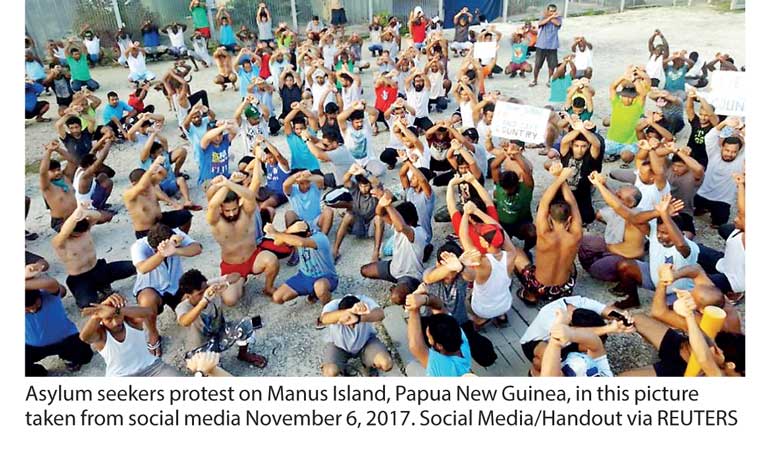Friday Dec 13, 2024
Friday Dec 13, 2024
Wednesday, 8 November 2017 00:00 - - {{hitsCtrl.values.hits}}

Sydney (Reuters): Papua New Guinea’s Supreme Court rejected an application on Tuesday to restore water, electricity and food supplies to an Australian-run detention centre for asylum seekers where nearly 600 men have been barricaded for a week.
The men in the remote Manus Island facility have defied attempts by Australia and Papua New Guinea to close the camp, refusing to move to three transit centres despite having little food or drinking water. Dozens of them also need medical help, three asylum seekers said, in a stand-off that the United Nations has described as a “looming humanitarian crisis”.
The men have repeatedly said they would not move to the transit camps because they feared PNG residents on the island may attack, or that the will be resettled elsewhere in PNG or another developing nation.
The court rejected the challenge on behalf of one of the detainees because it said power, water and food were available at the three transit centres, Ben Lomai, a lawyer for the detainee who lodged the application, told Reuters.
Kate Schuetze, Pacific researcher for rights group Amnesty International, warned conditions could deteriorate “catastrophically”.
“The lives of these men, who are only asking for their rights to dignity and safety, are at serious risk,” Schuetze said in a statement.
The men, who include asylum seekers from Afghanistan, Iran, Myanmar, Pakistan, Sri Lanka and Syria, were last given food on Oct. 29 and have been relying on sporadic aid from Manus island locals and rainwater.
Several of the detainees told Reuters Papua New Guinea’s navy had blocked access for islanders trying to deliver supplies in the past few days. Representatives for Papua New Guinea Immigration Minister Petrus Thomas did not respond immediately to a request for comment about the claim. Australian Prime Minister Malcolm Turnbull said before the court ruling on Tuesday the men were only refusing to move to the new transit centres on the encouragement of advocates.
“There are alternative facilities available of a very high quality with food and all of the facilities,” Turnbull told Australian Broadcasting Corporation radio.
The relocation of the men is designed to give the United States time to complete vetting of candidates as part of a refugee swap deal that Australia hopes will see it no longer responsible for the detention of nearly 1,400 asylum seekers who have been classified as refugees.
Turnbull negotiated the deal with former U.S. President Barack Obama last year. Under the deal, Australia will accept refugees from Central America.